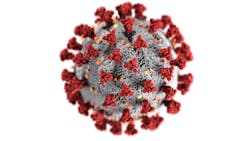Research Suggests Many Consumers Wary Of Using Touchscreens In Public Places Due To COVID-19
Research conducted by natural user interface company Ultraleap states that roughly 12% of respondents in the U.S. and the U.K. believe that touchscreens located in public spaces are hygienic.
BRISTOL, England, May 27, 2020 /PRNewswire/ -- Consumers on both sides of the Atlantic have raised concerns about touching public screens at self-service, supermarket checkouts, in health centres and at public transport ticketing kiosks as they look forward to a world post-lockdown.
Research by natural user interface company, Ultraleap, in late April and early May, found that among 538 respondents split almost 50:50 between the United States (267) and the United Kingdom (271), just 12% (14% US / 9% UK) believed that touchscreens in public spaces are hygienic, while more than 82% on average (79% US / 85% UK) were confident that touchless interfaces would be more hygienic and give them better protection.
"Touchless gesture-based interfaces are clearly preferred as a future option over touchscreens, counter service, or mobile apps," said Steve Cliffe, CEO of Ultraleap. "With consumers stating that the number one drawback of public touchscreens is that they are unhygienic and that the single greatest benefit of "contactless" is that it's touch-free, we believe gesture control technologies will play a significant role in restoring consumer confidence in retail and other public environments in a post-COVID-19 world."
Consumers in the UK (71%) and the US (74%) said they expected to interact with touchless technologies, such as gesture interfaces, in the future. In restaurants, would-be diners on both sides of the Atlantic said they would prefer touchless gesture ordering (US 33% / UK 35%) to making orders across a counter (US 27% / UK 24%), mobile apps (US 22% / UK 21%), with public touchscreens the least preferred (US 18% / UK 20%).
In a 2016 American Journal of Infection Control study, 100% of the 17 public grocery store touchscreens tested were found to have bacterial on them and 59% were found to have dangerous bacteria. In the UK, a 2009 study of London's public transport network showed that more than 60% of touch surfaces had high levels of bacterial contamination.
"When the average supermarket check-out touchscreen is used as often as 350 times a day by different consumers, it is not hard to understand how easy it is for the screen to become contaminated and also just how difficult it is to find time slots to properly clean them and to keep them sanitised," said Saurabh Gupta, Director of Out-of-Home Product at Ultraleap.
"Consumers are telling us they are almost twice as likely (1.8 times) to interact with touchless interfaces, in the future, than the touchscreen technology they have used to date," he added.
